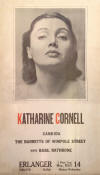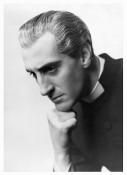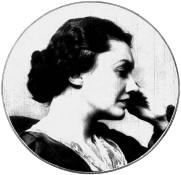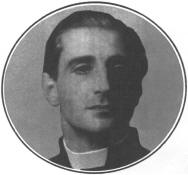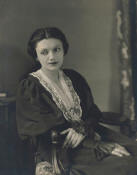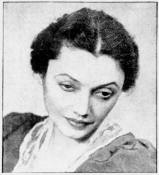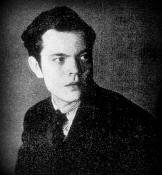CandidaA comedy by George Bernard Shaw, arranged in three acts and five scenes by Katharine Cornell. One of the three-play repertory for the seven-month transcontinental tour, which began in November 1933, Candida was not performed until the company reached Seattle. It was performed 42 times during the tour. Produced by Katherine Cornell, staged by Guthrie McClintic, setting and costumes designed by Woodman Thompson. General Representative, Gertrude Macy; Company Manager, Allan Attwater; Technical Director, Kay Drain Lawson; Stage Manager, James Vincent; Assistant Stage Manager, R. Birrell Rawls; Assistant in Advance, Morton Nathanson; Advance Representative, Ray Henderson. The ladies dresses executed by Helene Pons Studio; other costumes and uniforms by Eaves Costume Co., Inc. Production built by T. B. McDonald Construction Co. and painted by Robert Bergman Studios. Electrical equipment by Century Lighting Company. Shoes by I Miller & Sons, Inc. Wigs by A. Barris.
Candida is one of George Bernard Shaw's early plays. The story is of the suburban English parson who is able to solve the difficulties of his parishioners, but is cruelly put to the test when he discovers that the rebellious young poet, Marchbanks, has fallen in love with his wife, Candida. The poet assumes that Candida's family life is dull, and he wants to rescue her. Candida must choose between her husband and the young poet. Candida is played in the period in which it was written, the last decade of the 19th century. Miss Cornell dresses the comedy in the period in which it was written. Candida is a one-set play and the action transpires in one day. The scene is the sitting room of a vicarage in a London suburb.
Candida was one of three plays that Katharine Cornell and her company performed during a transcontinental tour from November 1933 through June 1934. Details of the tour can be found here: Cornell Tour 1933-1934 . In his autobiography, Basil Rathbone wrote: "I have always disliked Shaw's Candida. It is such a pompous, ultra women's-rights play, with both Morrell and Marchbanks unnecessarily sacrificed to Candida's annoying self-righteousness and her smug sense of superiority. But with Miss Cornell all this simply didn't matter! She was so beautiful and so desirable that had she murdered Morrell and married Marchbanks we would have forgiven her—or almost—because in this production Marchbanks was played by Orson Welles, whose performance was so fatuously unpleasant that Morrell became, by contrast, a deeply sympathetic character, which most certainly was not Mr. Shaw's intention." (In and Out of Character, p. 121) In an interview with the Oakland Tribune (February 4, 1934), Katharine Cornell said, "When I discussed the matter of repertory with Rathbone in England last year, I told him I realized that Morrell was not his part, but I had no choice and I wanted him for Romeo and Browning. Yet look what he did with the Rev. Morell. You wouldn't recognize him for the pompous ass that Shaw created and most actors have accentuated." Cornell also wrote, "Brenda Forbes' Prossy was, in some of its aspects, the best I had seen, and Orson made a tremendously interesting Marchbanks, and Basil a handsome Morell." (I Wanted to Be an Actress, p. 134)
"Basil Rathbone, reading magnificently and bringing a quiet sensitivity into his playing, made a splendid figure of Morell." —The San Francisco Examiner, January 13, 1934 "Basil Rathbone is the Morell. He makes the part believable. One understands how it is that all women have 'Prossy's complaint'—they fall in love with him; also why the splendid Candida loves him, and his power over audiences. There is the suggestion of eloquence in this Morell." —George C. Warren, San Francisco Chronicle, January 12, 1934 The Rev. Morell is, ordinarily, a pompous, verbose dullard whose self-sufficiency makes him a prig. Like Miss Cornell, Rathbone chose to explore that character of the parson. What he found beneath the surface of his black coat was most interesting. His Morell emerges from his dreadful experience fully a man and even in his losing battle of wits with Marchbanks he is the victor. It was as fine a bit of work as one may wish to see in the theater." —Wood Soanes, Oakland Tribune, January 12, 1934 "Candida is notable also for the performance of Basil Rathbone, who gives a performance that measures up to every expectation. He forgets his own personality in the characterization of James Mavor Morell, as complacent as a husband as he is complacent as a clergyman. From the first you believe and understand him. Aptly he shows that complacency is a boon for the possessor and at the same time a hideous trial for those who, acknowledging the truth, must witness it. And when the young poet fires his barrage of hysterical truths, the clergyman regards him as a demon sent to shake his faith!" —Elizabeth Yeaman, Los Angeles Evening Citizen News, January 30, 1934 "Basil Rathbone was splendid as the husband, posing no more perhaps because he is a parson than because he has Candida for wife. His performance was most convincing, and his appearance had just the proper mingling of physical beauty and spiritual uplift to justify the infatuation of his women parishioners." —Florence Lawrence, Los Angeles Examiner, January 30, 1934
"Rathbone, as the pompous preacher who is forced to a battle of wits with the whining rhymester for the love of his own wife, is excellent in that he makes a man of a character that has always been a stick since it left Shaw's pen." —Wood Soanes, Oakland Tribune, Feb. 7, 1934 "Basil Rathbone, as the Rev. Mr. Morell, instilled into the part the force and energy of the clergyman crusading for social (not moral) reform. His performance was seasoned with restraint throughout, perhaps a little to the detriment of the final scene, in which he is revealed the human being, pitifully dependent on his wife." —The Salt Lake Tribune, Feb 11, 1934 "In Candida, Cornell did the almost impossible; she made the dominie's wife lovable—and credible! The character, as George Bernard Shaw created her, is not a wholly pleasant woman; recall but a few of her prescribed lines and actions. Orson Welles as the lovesick poet, Marchbanks, swamped in his own adolescent emotionalism, gave a performance which literally evoked cheers, and Rathbone as the clergyman husband of Candida presented a sterling interpretation of the forthright, self-sure man." —Salt Lake Telegram, February 12, 1934 "Basil Rathbone, who has created for himself a distinctly enviable position, scores again in a role of middle-aged pastor to whom misfortune has appeared to smile." —Fred Speers, Denver Post, Feb. 16, 1934
"Mr. Rathbone came into his own indeed in Candida last night. His acting of his part left little or nothing to be desired." —The Kansas City Times, March 7, 1934 "Basil Rathbone, as the perplexed preacher, carries the heaviest dramatic burden lightly with his consummate art. Miss Cornell is a perfect Candida. The ease and grace of her portrayal is a delight to see. Orson Welles plays the unhappily yearning Marchbanks with a disquieting relish. His reading of the role is all the could be desired, but he is too abnormally neurotic in his impersonation to be taken as a serious contender for the love of such a well balanced woman as Candida." —Lowell Lawrance, Kansas City Journal, March 7, 1934 "Miss Cornell, of course, is the Candida. Shaw is reported to have said that hers is the finest interpretation of all that have been given of the character. True as that may be, she could not, or rather did not, excel the splendid portrayals by Basil Rathbone as her husband, and by Orson Welles as her youthful and ardent lover. But then the two roles are stronger, even, than the title part." —Herbert L. Monk, St. Louis Globe-Democrat, March 21, 1934 "It is the usual triangle plot, set this time between an English vicar of mature years, and 18-year-old poet, and the necessary wife. As the youngster, Mr. Welles' portrayal was one full of fluttering timidity and gasping shyness, played with an artist's touch. Mr. Rathbone was his usual urbane self, dominating scenes with his compelling personality and dramatic power." —Tod Raper, The Columbus Dispatch, March 29, 1934
"Basil Rathbone played with finesse and skill as Morell, thereby lifting the scenes between Candida, Marchbanks and Morell to the heights." —Walter Whitworth, The Indianapolis News, April 2, 1934 "Mr. Rathbone gave an excellent portrayal of Morrell." —Robert G. Tucker, The Indianapolis Star, April 2, 1934 "The Morell of Basil Rathbone is many degrees beyond reproach—a pretty and sound piece of portraiture." —Max Sien., The Cincinnati Post, April 5, 1934 "The play rather belongs to Basil Rathbone and Orson Welles. Mr. Rathbone, transformed from an ardent Browning into the ecclesiastic Morell, again performs with conviction and distinction, but it must be said to the credit of young Mr. Welles that he is more than a match for the veterans in the company." —Harry Martin, The Commercial Appeal (Memphis), April 15, 1934
"Basil Rathbone gave a good-mannered sketch, done with dramatic dignity." —Clearance Boykin, Richmond Times-Dispatch, May 2, 1934 "The Rev. Mr. Morell, as played by Basil Rathbone, is no conventional clod who is shocked at the erstwhile advanced views of Marchbanks. He reacts to them rather conventionally, but Mr. Rathbone so splendidly portrays him as a gentleman trying to be rational under a variety of harassments that all sympathy is with him. When he seizes the poet's throat in the first act doubtless many would wish him success in his enterprise were it not so early in the play." —Rollin Palmer, The Buffalo News, May 15, 1934 "Basil Rathbone's James is good Church of England rightness, somewhat shaken off his pedestal and rather human in places, while Orson Welles plays Eugene like the slightly absurd or slightly pathetic person he may appear." —William H. Haskell, Knickerbocker News (Albany, NY), May 24, 1934 "The performance of Candida was perfection. ... Mr. Rathbone was splendid. His embodiment of the "pleasantness of muscular Christianity" at the outset, his transitions to doubt and anxiety, and his standing stripped down to humility at the close the descent into an emotional Avernus, was done with every delicacy of conception and clarity of delineation." —Hartford Courant, May 31, 1934 "Mr. Rathbone's Morell was more than equal to the dramatist's conception, vital, yet, constrained." —Louise Mace, The Springfield Daily Republican, June 6, 1934
The Cornell company performed Candida for the final time in this tour at the Court Square Theater in Springfield, Massachusetts. For the rest of the tour they performed only The Barretts of Wimpole Street.
|







